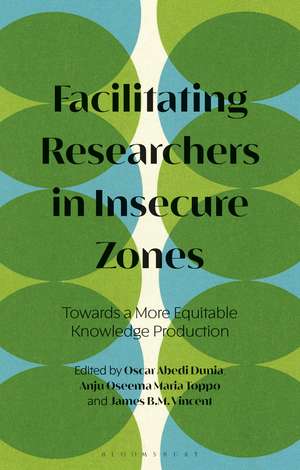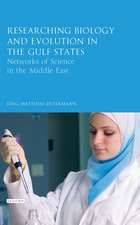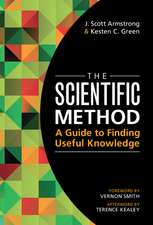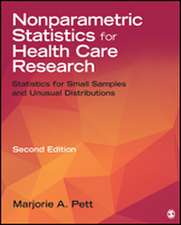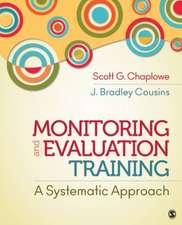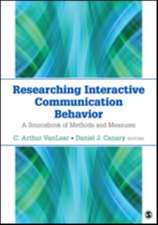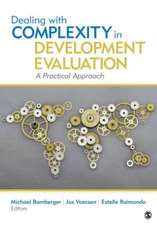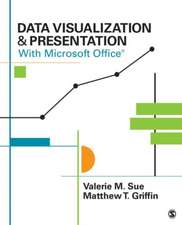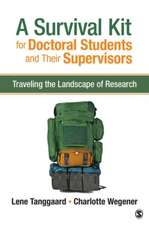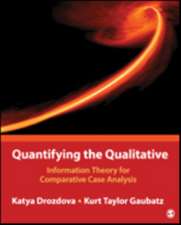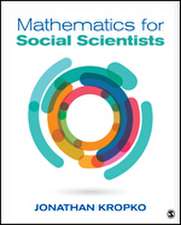Facilitating Researchers in Insecure Zones: Towards a More Equitable Knowledge Production
Editat de Oscar Abedi Dunia, Anju Oseema Maria Toppo, James B.M. Vincenten Limba Engleză Hardback – 23 aug 2023
| Toate formatele și edițiile | Preț | Express |
|---|---|---|
| Paperback (1) | 149.02 lei 22-36 zile | |
| Bloomsbury Publishing – 23 aug 2023 | 149.02 lei 22-36 zile | |
| Hardback (1) | 405.07 lei 43-57 zile | |
| Bloomsbury Publishing – 23 aug 2023 | 405.07 lei 43-57 zile |
Preț: 405.07 lei
Preț vechi: 534.74 lei
-24% Nou
Puncte Express: 608
Preț estimativ în valută:
77.52€ • 80.44$ • 64.79£
77.52€ • 80.44$ • 64.79£
Carte tipărită la comandă
Livrare economică 17-31 martie
Preluare comenzi: 021 569.72.76
Specificații
ISBN-13: 9781350265660
ISBN-10: 1350265667
Pagini: 208
Dimensiuni: 138 x 216 x 25 mm
Greutate: 0.39 kg
Editura: Bloomsbury Publishing
Colecția Bloomsbury Academic
Locul publicării:London, United Kingdom
ISBN-10: 1350265667
Pagini: 208
Dimensiuni: 138 x 216 x 25 mm
Greutate: 0.39 kg
Editura: Bloomsbury Publishing
Colecția Bloomsbury Academic
Locul publicării:London, United Kingdom
Caracteristici
Calls out the persistence of unethical and exploitative research practices, highlighting inequalities in knowledge production and raising questions about legitimacy of research outputs associated with them
Notă biografică
Oscar Abedi Dunia is an independent researcher and President of the NGO Aide Rapide aux victimes des catastrophes et Recherche (ARCV), based in South Kivu, DR Congo. He has worked with researchers from Europe and the US, as well as with journalists, the UN mission, and various international humanitarian organizations.Anju Oseema Maria Toppo is Assistant Professor in the Department of History, St. Xavier's College, Ranchi, in Jharkhand, India. She is also active in the social and resistance movements of the Adivasi (indigenous) population of Jharkhand.James B.M. Vincent is a researcher and consultant on governance, development and conflict-related issues, youth development and employment creation programmes, and agriculture in Sierra Leone and the Mano River region.Maria Eriksson Baaz is Professor in Political Science at the Department of Government, Uppsala University, Sweden.Swati Parashar is Associate Professor in Peace and Development at the School of Global Studies, Gothenburg University, Sweden.Mats Utas is Professor in Cultural Anthropology at Uppsala University, Sweden.
Cuprins
Chapter 1: Spotlight on the Research Backstage: Introduction by the Editors Chapter 2: Getting and Keeping Engaged Chapter 3: The Indispensable Bridge: "Without us no Research" Chapter 4: Systematically Silenced and non-Recognized Chapter 5: Navigating Insecurity with Scarce Resources Chapter 6: Beyond a Narrow South/North Divide Chapter 7: Beyond the Bleak Picture: Comraderie into the Future Chapter 8: Recommendations: How to Bring about Change?
Recenzii
For anyone interested in global postcoloniality, this is a wonderful and must-read book by mainly Global South-based researchers on North-South knowledge production. Rooted in Global South sites of armed conflict, the book's contributions are all the more compelling - and therefore all the more insightful - on the perils and potentialities of researcher relationships and knowledge co-production across the North-South, elite-subaltern, war-peace, and class/gender/ethnic/racial divides.
Facilitating Researchers sheds needed light on the plight of unsung heroes, those Global South scholars who despite their role in shaping the production of knowledge are hardly acknowledged. It is a timely decolonial intervention that charts a new course for doing ethical and more equitable fieldwork in the Global South.
This book catalyses transformative thinking about the ethics and practice of equitable research partnerships between researchers in the global north and global south. It brings together compelling chapters by researchers from Sierra Leone, Congo and Jharkhand who share their reflections of working in insecure zones through multiple relationalities between communities and institutions across diverse spatial contexts and social hierarchies. This book is a must read for scholars and practitioners of international development and international relations who are looking for practical and actionable ways for decolonising research methods in conflict and post conflict settings.
This volume provides an honest, useful analysis for researchers from various disciplines on the difficult question of collaboration between research teams. The various chapters provide powerful accounts and innovative approaches to understanding the complex relationships between those who make research possible in often very difficult contexts and in some cases in their communities where research is conducted who they call 'facilitating researchers', and those from 'Contracting researchers' often from outside the researched communities. The examples drawn from lived experiences are rich as they are from various countries in Africa, and Asia but also reflect on dilemmas familiar to researchers globally. Unlike most literature on similar topics, the volume concludes with practical ideas that point to more hopeful future pathways to navigate these ethical challenges during the research process in sensitive contexts.
A must read volume for everybody that do research on the ground in fragile, conflict-prone countries. It breaks the silence about the local researchers that often provides the bulk of the empirical material that ends up as the product to which a researcher based in North America or Europe pens his or hers name. The volume makes a strong case for a critical rethinking of how research is done in resource-poor environments and how new and real partnerships around co-authorship beyond borders can be made.
Facilitating Researchers in Insecure Zones is a compelling and innovative book that highlights the unequal relationship between Contracting Researchers and Facilitating Researchers engaging in research in conflict-affected countries. Examples from experiences in Sierra Leone, India and DR Congo are used to discuss the types of inequalities in the research process, from the conceptualization of the research to the publication of the research findings and analysis, including the funding of the research. It is an invaluable resource for researchers to establish a good and equal relationship prior to future research endeavors.
Facilitating Researchers sheds needed light on the plight of unsung heroes, those Global South scholars who despite their role in shaping the production of knowledge are hardly acknowledged. It is a timely decolonial intervention that charts a new course for doing ethical and more equitable fieldwork in the Global South.
This book catalyses transformative thinking about the ethics and practice of equitable research partnerships between researchers in the global north and global south. It brings together compelling chapters by researchers from Sierra Leone, Congo and Jharkhand who share their reflections of working in insecure zones through multiple relationalities between communities and institutions across diverse spatial contexts and social hierarchies. This book is a must read for scholars and practitioners of international development and international relations who are looking for practical and actionable ways for decolonising research methods in conflict and post conflict settings.
This volume provides an honest, useful analysis for researchers from various disciplines on the difficult question of collaboration between research teams. The various chapters provide powerful accounts and innovative approaches to understanding the complex relationships between those who make research possible in often very difficult contexts and in some cases in their communities where research is conducted who they call 'facilitating researchers', and those from 'Contracting researchers' often from outside the researched communities. The examples drawn from lived experiences are rich as they are from various countries in Africa, and Asia but also reflect on dilemmas familiar to researchers globally. Unlike most literature on similar topics, the volume concludes with practical ideas that point to more hopeful future pathways to navigate these ethical challenges during the research process in sensitive contexts.
A must read volume for everybody that do research on the ground in fragile, conflict-prone countries. It breaks the silence about the local researchers that often provides the bulk of the empirical material that ends up as the product to which a researcher based in North America or Europe pens his or hers name. The volume makes a strong case for a critical rethinking of how research is done in resource-poor environments and how new and real partnerships around co-authorship beyond borders can be made.
Facilitating Researchers in Insecure Zones is a compelling and innovative book that highlights the unequal relationship between Contracting Researchers and Facilitating Researchers engaging in research in conflict-affected countries. Examples from experiences in Sierra Leone, India and DR Congo are used to discuss the types of inequalities in the research process, from the conceptualization of the research to the publication of the research findings and analysis, including the funding of the research. It is an invaluable resource for researchers to establish a good and equal relationship prior to future research endeavors.
